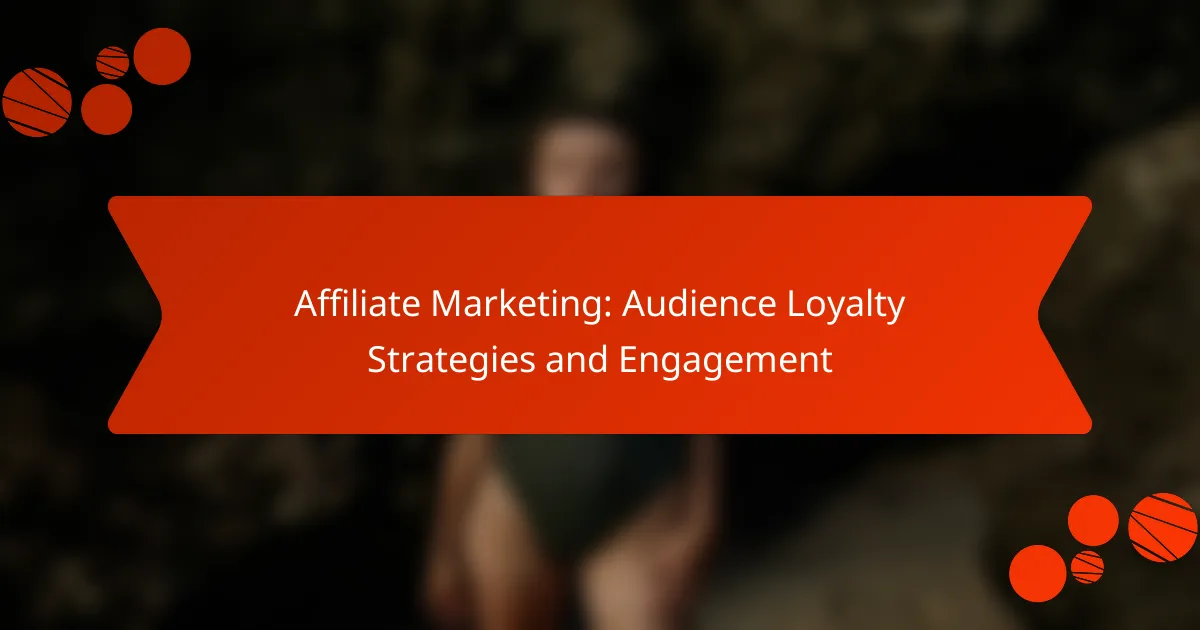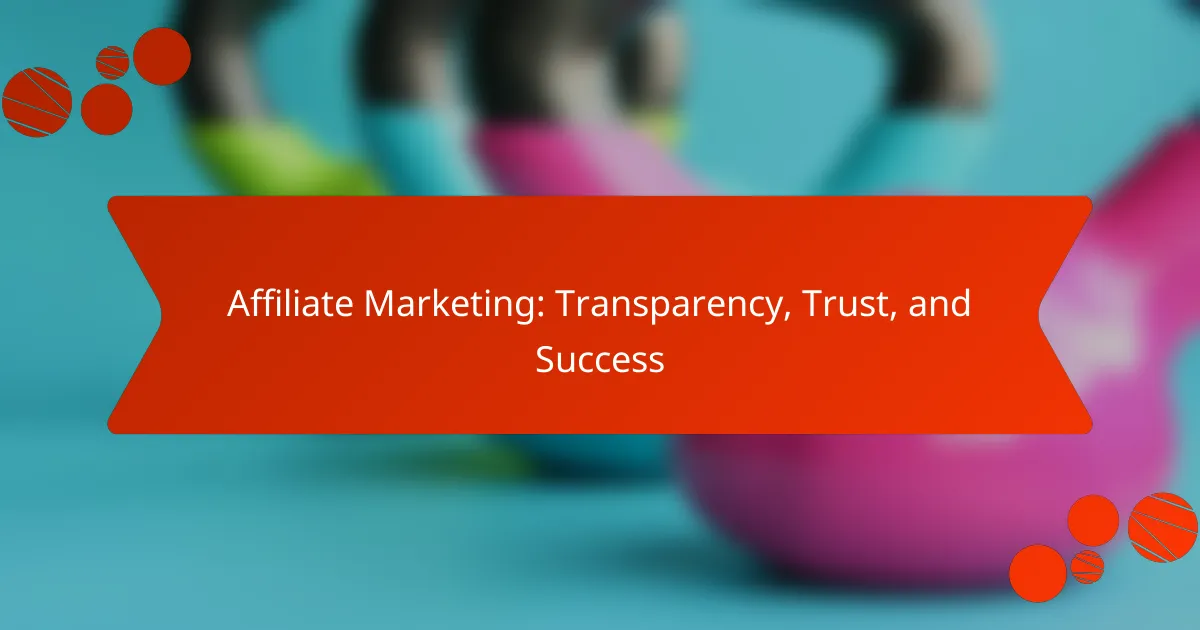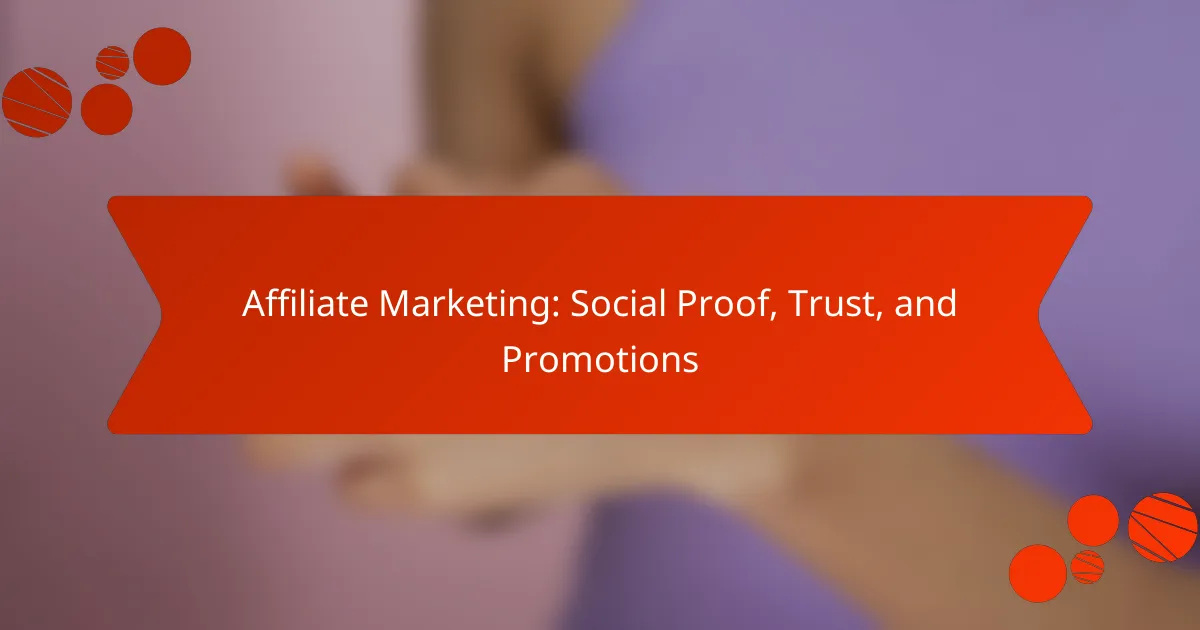In the competitive world of affiliate marketing, building audience loyalty is crucial for sustained success. By leveraging tailored content, consistent engagement, and exclusive incentives, marketers can create meaningful connections that foster trust and encourage repeat interactions. Additionally, effective engagement techniques and audience segmentation play vital roles in enhancing user experience and driving conversions, ultimately leading to stronger customer retention.

How can affiliate marketers build audience loyalty?
Affiliate marketers can build audience loyalty by creating meaningful connections through tailored content, consistent engagement, and exclusive incentives. These strategies foster trust and encourage repeat interactions, which are essential for long-term success.
Personalized content strategies
Personalized content strategies involve tailoring messages and offers to individual audience preferences and behaviors. By analyzing user data, marketers can create content that resonates more deeply, increasing engagement and loyalty.
For example, using segmentation techniques, marketers can send targeted promotions based on past purchases or browsing history. This approach not only enhances user experience but also boosts conversion rates.
Engagement through social media
Social media platforms are vital for engaging with audiences and building loyalty. Regularly posting relevant content and interacting with followers helps create a community around the brand.
Marketers should encourage discussions, respond to comments, and share user-generated content. This two-way communication fosters a sense of belonging and loyalty among followers.
Exclusive offers and rewards
Offering exclusive deals and rewards is an effective way to cultivate audience loyalty. These incentives can include discounts, early access to products, or loyalty points that can be redeemed for future purchases.
For instance, a monthly subscription service might offer members-only discounts or special promotions. Such exclusivity makes customers feel valued and encourages them to remain engaged with the brand.
Email marketing campaigns
Email marketing campaigns are a powerful tool for maintaining audience loyalty. By sending personalized emails that provide valuable content, updates, and exclusive offers, marketers can keep their audience informed and engaged.
Regular newsletters or targeted campaigns based on user behavior can significantly enhance retention rates. It’s essential to ensure that emails are relevant and not overly frequent to avoid subscriber fatigue.
Community building initiatives
Community building initiatives create a sense of belonging among audience members. This can be achieved through forums, social media groups, or events where users can connect and share experiences related to the brand.
Encouraging user interaction within these communities fosters loyalty, as members feel more invested in the brand. Marketers should facilitate discussions and highlight community contributions to strengthen these bonds.

What are effective engagement techniques for affiliate marketing?
Effective engagement techniques for affiliate marketing include strategies that foster interaction and build loyalty among audiences. These techniques enhance user experience, encourage participation, and ultimately drive conversions.
Interactive content formats
Interactive content formats such as quizzes, polls, and surveys can significantly boost audience engagement. These formats invite users to participate actively, making them feel more connected to the brand and its offerings.
Consider using tools that allow for easy integration of interactive elements on your website or social media platforms. For instance, a quiz related to a product can provide personalized recommendations, enhancing the user experience and increasing the likelihood of conversion.
Live webinars and Q&A sessions
Live webinars and Q&A sessions create opportunities for real-time interaction between affiliates and their audience. These sessions allow for direct engagement, where participants can ask questions and receive immediate feedback, fostering a sense of community.
To maximize effectiveness, choose relevant topics that address common pain points or interests of your audience. Promote these events in advance through email marketing and social media to ensure good attendance and engagement.
Gamification elements
Incorporating gamification elements such as points, badges, and leaderboards can enhance user engagement in affiliate marketing. These elements motivate users to participate more actively, as they can earn rewards for their interactions.
For example, you might create a referral program where users earn points for sharing content or making purchases. This not only encourages participation but also helps in building a loyal customer base that feels rewarded for their engagement.

How does audience segmentation enhance loyalty?
Audience segmentation enhances loyalty by allowing marketers to tailor their strategies to specific groups, resulting in more relevant interactions. By understanding the unique needs and preferences of different segments, businesses can foster deeper connections and improve customer retention.
Targeted messaging for different demographics
Targeted messaging involves crafting communications that resonate with specific demographic groups, such as age, gender, or location. For instance, a brand selling outdoor gear might create distinct campaigns for millennials focused on adventure travel and for families emphasizing safety and durability.
To effectively implement targeted messaging, consider using customer data to identify key characteristics of your audience segments. This can help in designing personalized email campaigns or social media ads that speak directly to the interests of each group, increasing engagement and loyalty.
Behavioral analysis for personalized offers
Behavioral analysis uses data on customer actions, such as purchase history and website interactions, to create personalized offers. For example, if a customer frequently buys fitness products, sending them exclusive discounts on new workout gear can enhance their loyalty to the brand.
Utilizing tools like analytics software can help track customer behavior and identify patterns. By segmenting your audience based on these behaviors, you can develop tailored promotions that not only meet their needs but also encourage repeat purchases, ultimately strengthening customer loyalty.

What role does trust play in affiliate marketing?
Trust is essential in affiliate marketing as it directly influences consumer decisions and engagement. Affiliates who establish trust with their audience can drive higher conversion rates and foster long-term loyalty.
Transparency in promotions
Transparency in promotions involves clearly disclosing affiliate relationships and any potential conflicts of interest. This honesty helps build trust, as audiences appreciate knowing when a recommendation may benefit the promoter financially.
To maintain transparency, affiliates should use clear language and visible disclaimers, such as “This post contains affiliate links.” Regularly updating audiences about partnerships can also enhance credibility.
Building credibility through testimonials
Testimonials can significantly enhance credibility in affiliate marketing by providing social proof. When potential customers see positive feedback from others, they are more likely to trust the affiliate’s recommendations.
Affiliates should collect and showcase genuine testimonials from satisfied customers. This can be done through reviews, case studies, or user-generated content, which can be featured on websites or social media platforms.

What metrics measure audience loyalty in affiliate marketing?
Key metrics that measure audience loyalty in affiliate marketing include customer retention rates, engagement rates on platforms, and conversion rates from loyalty programs. These metrics provide insights into how well an affiliate marketing strategy fosters long-term relationships with customers.
Customer retention rates
Customer retention rates indicate the percentage of customers who continue to engage with a brand over a specific period. High retention rates suggest that customers find value in the products or services offered, which is crucial for affiliate marketers aiming to build loyalty.
To calculate retention rates, divide the number of retained customers by the total number of customers at the start of the period, then multiply by 100. For example, if you start with 100 customers and retain 80, your retention rate is 80%.
Engagement rates on platforms
Engagement rates reflect how actively customers interact with content across various platforms, such as social media, email, or websites. Higher engagement rates often correlate with stronger audience loyalty, as they indicate that customers are invested in the brand.
To measure engagement, track metrics like likes, shares, comments, and click-through rates. For instance, an engagement rate of 2-5% on social media is generally considered healthy, while higher rates may indicate a particularly loyal audience.
Conversion rates from loyalty programs
Conversion rates from loyalty programs measure the effectiveness of initiatives designed to encourage repeat purchases. A higher conversion rate signifies that loyalty programs successfully motivate customers to return and make additional purchases.
To assess conversion rates, divide the number of customers who redeem loyalty rewards by the total number of customers enrolled in the program. A conversion rate of 10-20% is often seen as a good benchmark for loyalty programs, indicating that customers find the incentives appealing.

How can affiliate marketers leverage technology for engagement?
Affiliate marketers can enhance engagement by utilizing technology to streamline communication and personalize interactions with their audience. Tools like Customer Relationship Management (CRM) systems and AI-driven personalization techniques play a crucial role in building loyalty and improving user experience.
Utilizing CRM tools for relationship management
CRM tools help affiliate marketers manage customer interactions efficiently, allowing for better tracking of user behavior and preferences. By organizing customer data, marketers can segment their audience and tailor communications to specific groups, increasing the relevance of their messages.
For effective use of CRM, ensure that you regularly update customer information and analyze engagement metrics. This can help identify trends and areas for improvement, enabling you to adjust your strategies accordingly. Popular CRM platforms include Salesforce and HubSpot, which offer various features suitable for affiliate marketing.
AI-driven personalization techniques
AI-driven personalization techniques enable affiliate marketers to create customized experiences for their audience based on individual preferences and behaviors. By analyzing data patterns, AI can suggest products or content that resonate with users, enhancing their engagement and likelihood of conversion.
Implementing AI tools can involve using recommendation engines or chatbots that provide tailored responses. For instance, e-commerce affiliates might use AI to suggest products based on past purchases, while content affiliates can deliver articles that align with user interests. This level of personalization can significantly boost customer loyalty and retention.



